Beef jerky is a nutrient-dense, easily-preserved, and portable snack that provides high-quality protein when you are on the go and need something that’s not junk food.
It should be no surprise that it’s a very popular snack among everyone from bodybuilders and high-level athletes to people looking to exploit its high-protein and low-carb properties for weight loss.
You’ve got a lot of options when it comes to beef jerky, so what’s the best? Our research team has ranked the ten highest-quality beef jerky products for keeping your protein intake high all day long.
Research
Rankings
1. CHOMPS Grass Fed Beef Jerky Sticks
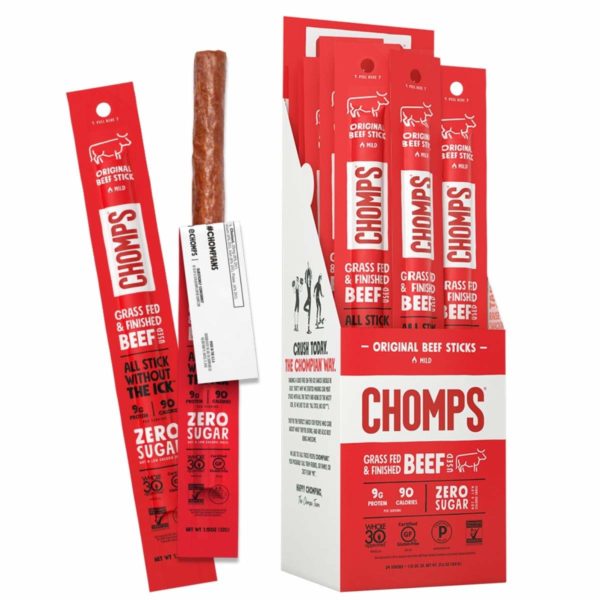
CHOMPS is definitely the best choice if you are using beef jerky as a high-protein snack for weight loss or weight loss maintenance.
This beef jerky comes from grass-fed beef, which means a healthier fat profile, and unlike many other beef jerky products, it uses no sugar in its ingredients, so you get high-quality protein with zero grams of carbohydrates.
Each beef stick is also a convenient 100 calories, making it easy to portion out servings.
2. Perky Jerky Wagyu Beef Jerky
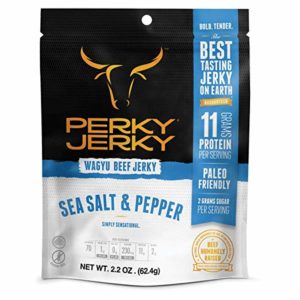
Perky Jerky strives for a bold, spicy flavor profile, and uses all-natural ingredients, including wagyu beef, to this end. We like the 11g of protein per serving, too.
Unlike many other flavor-rich beef jerkies, it only has 2g of sugar per serving.
This is arguably the best-tasting beef jerky, too, with sea salt and pepper being our favorite flavor.
3. Epic 100% Grass Fed Wagyu Beef Strips
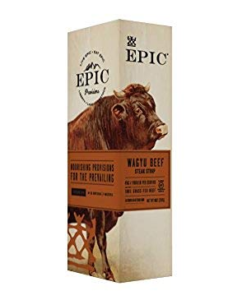
Epic is known for its high quality preserved meat snacks, and among those, their Wagyu Beef Strips are the best. Using a fat-rich cut of beef, Epic makes a beef jerky that’s got a better balance between fat and protein than many other beef jerkies.
The only issue some people may take with this product is that it uses honey to add to the sweetness of the jerky, so it does include 3 grams of sugar per strip. Hardcore zero-sugar dieters will want to find another option, but it’s a good option for many others.
4. Tillamook Country Smoker Beef Jerky
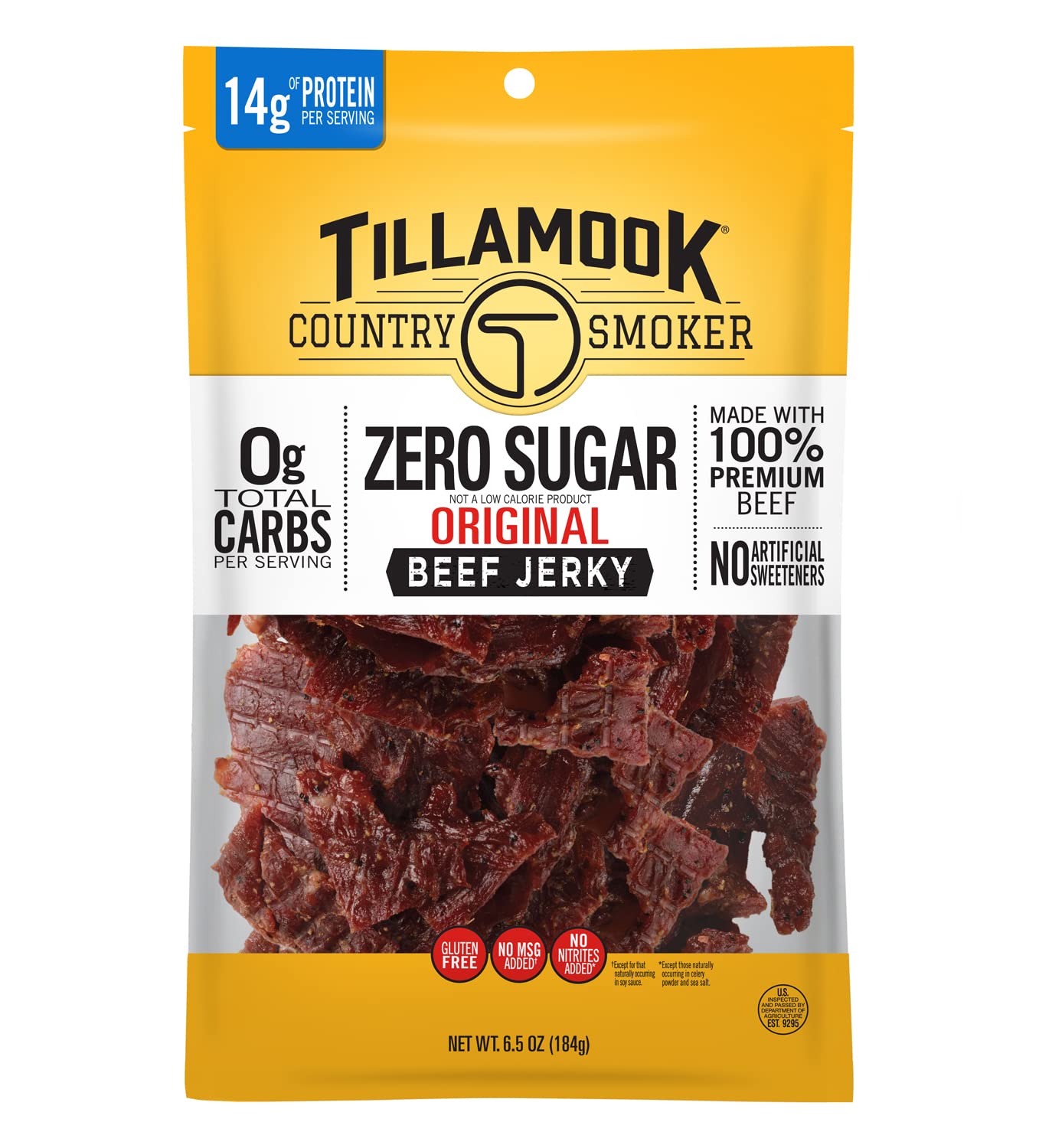
Tillamook makes a great beef jerky available in four different flavors, but the sugar-free original beef jerky flavor is our favorite. This classic beef jerky strip delivers a ton of protein and exactly zero sugar and zero carbs. The only downside is that the sodium content is somewhat higher than the competition.
5. Sogo Snacks Original Grass Fed Smoked Beef Sticks
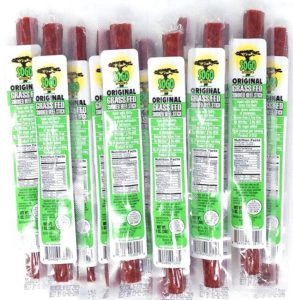
Sogo Snacks makes a no-nonsense beef jerky stick that uses grass-fed beef and no nitrates in the manufacturing process to make individually-wrapped beef sticks that have 90 calories each.
On top of that, there’s no sugar, making these a great naturally-flavored and produced beef jerky.
6. Nick’s Sticks 100% Grass-Fed Beef Sticks

Nick’s Sticks caters to people who want high-quality ingredients in a well-crafted beef jerky. This beef jerky uses hand-crafted spices and herbs along with grass-fed beef to make a product that’s nitrate-free, sugar-free, and gluten-free.
It’s a very solid choice for conscious consumers who care about purity, quality, and taste.
7. Righteous Felon Biltong Beef Jerky
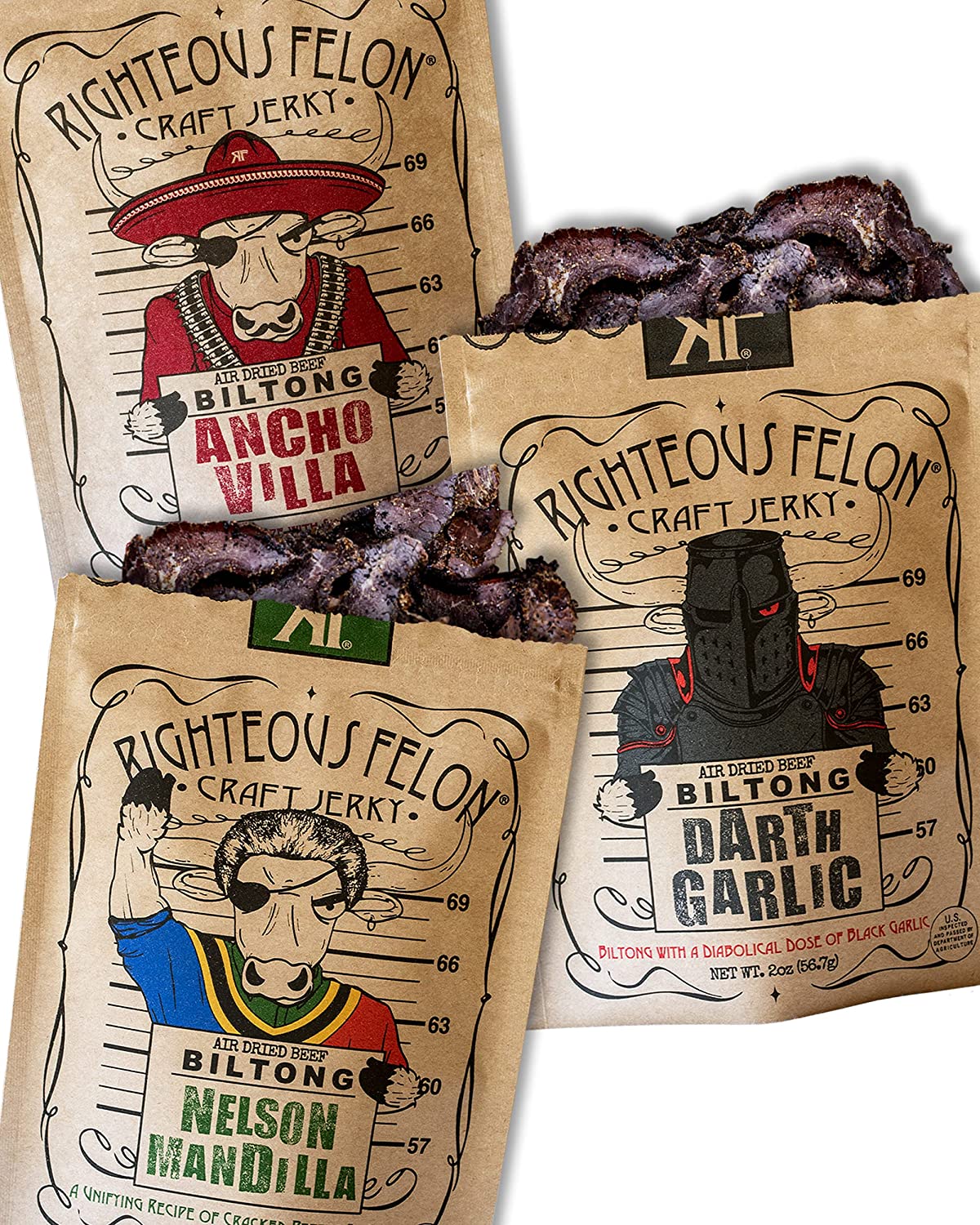
Looking for something a bit different? Give Righteous Felon a try—it’s a version of beef jerky known as “biltong,” which is popular in South Africa and uses a broader range of spices to season and preserve the beef. It’s got a stronger, more savory taste then you’d get in typical American beef jerky. The only downside is that it does use some sugar for flavoring.
8. Jack Link’s Beef Jerky Original
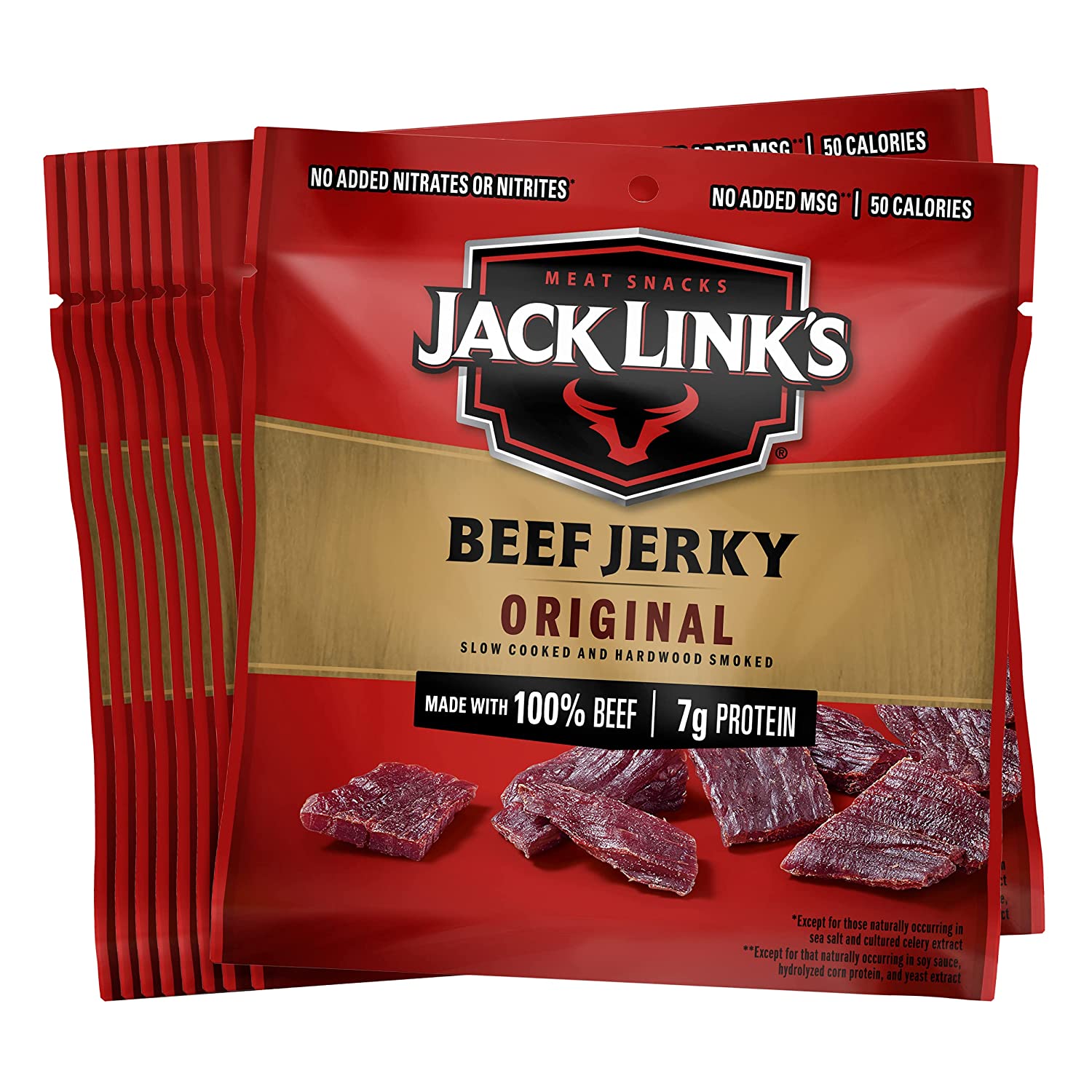
Jack Links is a classic and mainstay of beef jerky. Its straightforward and sweet flavor profile is palatable to just about anybody, though it’s no going to win any awards for boldness or innovation.
Hardcore low carb dieters might want to look elsewhere, as the carb content is a little on the high side: for every 12 grams of protein, you’re getting 4 grams of sugar. If you aren’t too worried about the carb content, it’s a solid choice.
9. Brooklyn Biltong Original
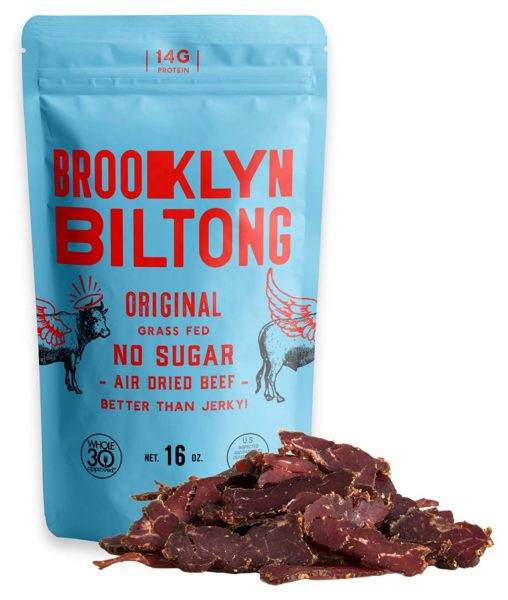
Is biltong the same as jerky? That’s a great way to start a fight with preserved meat lovers, but regardless, Brooklyn Biltong makes a great dried beef product.
These beef strips are super lean and completely sugar-free, making them an excellent choice for a high-protein snack.
Each serving has an impressive 15 grams of protein packed in to only 80 calories, and because biltong is naturally air-dried, it doesn’t use any nitrates or smoking in its manufacturing process, which could make it better for your long-term health.
10. Cattleman’s Cut Beef Jerky
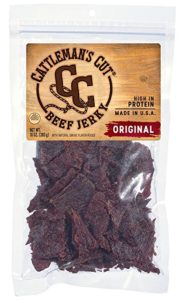
Cattleman’s Cut Beef Jerky is popular among those who like a sweeter and smoother flavor to their beef jerky, but this sweet flavor profile comes at a cost.
The sugar content is very high, at seven grams of sugar per nine grams of protein. This makes it good for occasional snacking, but a poor choice for athletes and for people looking to lose weight: that sugar content will not help with tilting your body composition towards more muscle and less fat.
Category winners
Best beef jerky overall: CHOMPS Grass Fed Beef Jerky
CHOMPS takes the top spot overall thanks to their high-quality formulation and great taste. By using grass-fed beef, you get a healthier fat profile, and the lack of sugar makes it a great snack for athletes, keto dieters, and anyone else looking for high-quality animal protein.
Best beef jerky for the keto diet: Tillamook Country Smoker Beef Jerky
With no sugar and zero grams of carbs, it’s hard to beat Tillamook when it comes to keto-friendly beef jerky. It’s perfectly suited for topping up your protein intake, while not affecting your total carb intake whatsoever.
Best beef jerky for travel: CHOMPS Grass Fed Beef Jerky
For a high-protein snack on the go, there’s no better option than CHOMPS. Their grass-fed beef jerky strips are individually wrapped and come in at exactly 100 calories, which makes them easy to stash in your bag on a trip.
Best beef jerky for weight loss: Tillamook Country Smoker Beef Jerky
Tillamook makes a fantastic beef jerky that’s sugar-free and carb-free, and comes in four different flavors. The fact that it’s totally carb-free and super low in fat makes it a great choice for dieters, whether you’re on the keto diet, a low carb diet, or another weight loss plan.
Best beef jerky without sugar: CHOMPS Grass Fed Beef Jerky
Our top overall pick is also our favorite when it comes to sugar-free beef jerky. By seasoning their beef with garlic, sea salt, black pepper, and coriander, CHOMPS creates a great, well-balanced flavor profile without having to resort to added sugar.
Best low sodium beef jerky: Perky Jerky Wagyu Beef Jerky
Perky Jerky keeps the sodium under control by using coconut tree sap and onion for seasoning, which cuts the sodium content to 230 mg per serving (some competitors have more than double this amount!). If you want to snack on beef jerky without taking a huge sodium hit, it’s your best option.
Who should buy beef jerky?
Beef jerky is safe for most people and is a great high protein snack for weight loss. It also helps provide amino acids for recovery post-workout and is a great way t get the benefits of red meat without consuming a ton of fat.
Some beef jerky products may contain gluten, so it is best to check the label before consuming it if you are intolerant to gluten. People with high blood pressure or kidney issues may also need to be careful with beef jerky, as it often contains a lot of salt.
Pregnant women and children are safe to consume beef jerky in moderation, but it’s best to speak to your doctor before if you have any concerns.
How we ranked
The beef jerky market is full of pretenders and contenders, making it that much more important to find the best for our health. The most important factor was the ingredients. Beef jerky should really consist of just a few ingredients: salt, beef, and some flavoring. Anything more is overkill in our books. This is why our top products, like Epic, ranked so well.
This minimalist approach also helps to keep the snack healthy since much popular beef jerky is loaded with unhealthy amounts of sugar. Cattleman’s Cut Beef Jerky contains upwards of 7g of sugar per serving, which is why it ranked so low on our list. Products like Perky Jerky that had less than 3g of sugar were rewarded – especially if they had an excellent taste profile.
In terms of allergens, gluten-free products like Nick’s Sticks ranked higher than their non-gluten-friendly counterparts. This was because we didn’t find a real need to include gluten in beef jerky since the main ingredient comes from beef. MSG was another common culprit we did not want in our products as it can cause a whole host of issues down the line. Any product with MSG was severely penalized, with most of them not making our list.
The quality of the beef was also important to consider. Grass-fed beef, like Chomps, ranked higher than grain-fed beef as it provides more nutrients, more protein, and less fat. It also provides more heart-healthy omega-3 fatty acids. Beef jerky made from certified organic beef was also preferred to ensure quality. In terms of the cut of beef, leaner was better. While waygu is prized for its flavor and quality, it tends to have a lot of fat – which is why we weren’t able to give those types of products the top spot.
Lastly, we looked at convince and portion control. While products that came in big value-packed bags tended to be cheaper, they often resulted in a lot of overeating. This is why we preferred products like Epic and Chomps that came in either small bag or individual packs for perfect portion control.
Benefits
Beef jerky is high in protein and sugar-free, making it great for weight loss. One of the most effective ways to break the cycle of metabolic and hormonal dysfunction that contributes to weight gain is by replacing sugar and refined carbohydrate intake with high quality protein.
Increasing your intake of protein for weight loss is a great strategy for two scientifically-validated reasons: first, it decreases feelings of hunger, and second, it actually increases your energy expenditure.
On the hunger front, protein has been demonstrated to increase feelings of satiety (the technical term for the feeling of fullness after a large meal) in scientific research published in the European Journal of Clinical Nutrition by researchers in the Netherlands (1).
Their study compared different meals with the same caloric content but differing ratios of fats, protein, and carbohydrates. They found that the high-protein meal created a greater feeling of fullness over the following 24 hours compared to the alternative meal compositions.
Animal protein from beef jerky is more effective at increasing energy expenditure. When it comes to increasing energy expenditure by up-regulating your body’s metabolism, protein—specifically protein derived from animal products—appears to be particularly effective, making beef jerky a great choice on this front as well.
According to research published by scientists from Denmark in the American Journal of Clinical Nutrition (2). They compared the boost in metabolism that resulted from a meal rich in soy protein, a meal rich in animal protein, and a meal rich in carbohydrates as a control.
Like with the previous study, all meals had equivalent caloric contents. As expected, both protein-rich meals produced an increase in energy expenditure over the next several hours, but the animal protein meal showed a definite edge over the vegetable derived protein.
The researchers attributed this effect to the higher quality and variety of amino acids present in animal protein compared to vegetable protein. Since all of the protein in beef jerky is high-quality and animal-derived, it’s an excellent way to exploit both of these effects for losing weight or adding lean body mass without gaining fat.
Beef jerky is a great way to get red meat without a lot of fat. While the health effects of high dietary intake of fat, and particularly saturated fat, are still controversial, there is enough scientific evidence indicating that getting lots of fat specifically from red meat might not be the best idea.
One study published in 2012 in the Journal of the American Medical Association Internal Medicine found that increased intake of red meat was associated with an increased risk of death from any cause, but this increase was attenuated after controlling for saturated fat intake (3).
This suggests that a low-fat source of red meat, like beef jerky, is better for you than a fatty cut of red meat. Both offer the benefits of high-quality protein and well-balanced amino acid profiles, but the beef jerky does so with a lower saturated fat content.
Recommended dose
Beef jerky is a processed meat, and there’s been quite a bit of research around the potential long-term consequences of high processed meat intake.
One review article published in 2015 in the journal Lancet Oncology reviewed the range of evidence supporting the connection of processed meat with in increased risk of cancer, specifically colorectal cancer (4).
This relationship has been observed in large epidemiological studies, and has been supported by more focused biochemical research on the potential mechanisms for the generation of carcinogenic compounds.
Some of the attention on what could be related to cancer risk from consuming a processed meat product like beef jerky has focused on the presence of nitrates, which are chemical compounds typically used to cure preserved meats like beef jerky.
According to research published in 2008 in the journal Meat Science, when nitrates are consumed, they can eventually generate carcinogenic compounds when exposed to stomach acid (5).
To this end, it might be better for your long term health to get a beef jerky product that does not use nitrates to preserve the meat, especially if you plan on using it as a regular snack.
While some of the harmful compounds in processed meats also appear to be related to processes like smoking, it’s a good bet that a beef jerky without nitrate is healthier for you than one with nitrate.
For weight loss, recommendations for supplemental protein are in the 0.8 to 1.2 grams per kilogram of body mass range (6). With the high protein content of beef jerky, one or two servings will help get you closer to this protein intake level.
The concerns about long-term health show a dose-response relationship, so you should strive to seek out several different sources of high-quality protein, versus relying on processed meat as your primary source of protein.
FAQ
Why was beef jerky originally invented? Beef jerky was originally conceived as a way to preserve meat for a long time without refrigeration. Today, it’s an incredibly convenient way to get high-quality protein as a snack, without the sugar, carbs, and fillers you’ll find in other portable snacks.
While there are some great protein bars for made for athletes and for people looking to lose weight, many are stuffed with a lot of sugar, and it’s hard to beat animal protein when it comes to absorption and amino acid quality.
How is beef jerky consumed? Beef jerky is dehydrated cuts of meat that are packed and sold in various stores. They are made with various seasonings, and some of them can be high in salt. Beef jerky is usually consumed as a snack, just like chips, but it can also be added in soups and salads.
What type meat is best for beef jerky? The sirloin tip, eye of round, top round, bottom round, flank steak, or any part that you can easily separate the meat from the fat, can be used to make beef jerky. The less fat there is, the better it is for making jerky.
What does beef jerky taste like? Typically, beef jerky tastes like salty, dry meat. Certain products may also come with their own unique flavors or seasonings such as barbecue, habanero or sweet chilli.
What are the nutritional constituents of beef jerky? Beef jerky is packed with nutrients such as protein, salt and healthy fats. Additionally, you can get a good amount of zinc and iron, which is good for the blood. Other micronutrients that you will be able to find in beef jerky are magnesium, choline, and vitamin B12.
Is beef jerky good for bodybuilding? Yes, beef jerky is a good post-workout snack. It is full of protein (40 grams of beef jerky will have around 14 grams of protein) and can be great for fulfilling the protein requirements of the body of an athlete. It can also cover up to 10% of the daily protein requirement for an athlete or someone who is looking to gain muscle.
Is beef jerky a healthy snack? Beef jerky is rich in many micro and macronutrients and is also a good low carbohydrate and high protein snack. Hence, it can be considered a healthy snack. However, just like any other snack, it should be consumed in moderation, since it is also high in sodium and cholesterol.
Is beef jerky gluten-free? Yes, beef jerky is made of meat, which means that it should be 100% gluten-free. However, there are certain beef jerkys on the market that have gluten ingredients used as flavor enhancers, which should be avoided if you are looking for gluten-free options. Gluten is only found in wheat, so any ingredient that contains wheat should be avoided.
Is beef jerky being best for keto? Yes, beef jerky is keto-friendly. Since it is meat, beef jerky is usually very high in protein content. Some thinner beef jerky lacks some fat calories but can easily be paired up with cheese or nut butter to make a very healthy keto snack.
Will beef jerky make you fat? Eating too much beef jerky can contribute to weight gain. It is packed with proteins and fats and has a lot of calories. If we consider one serving of 30g beef jerky, it has around 120 calories. Too many calories from eating beef jerky, and no exercise can lead to weight gain. Beef jerky can also lead to increased cholesterol levels.
Will beef jerky raise blood sugar? Beef jerky is a good snack for you to consume if you have diabetes. Since it is rich in protein and has very little carbohydrate, it can help keep your blood sugar in check. However, since beef jerky is high in sodium, because of its salt content, it might lead to high blood pressure. So, people with both diabetes and hypertension should avoid eating it.
Can I feed beef jerky to my pets? You should avoid giving your pets the beef jerky that has been made for humans. It might have some ingredients that might not be easily digested by your dogs and cats. Most of the beef jerkys available in the market have spices and high amounts of sodium, which can be bad for your furry friends.
Feeding them with dried meat occasionally is healthy. However, you should check the ingredients first. Further, there are special beef jerky products designed especially for the canine and feline companions that can be bought from your local grocery stores.
How long does it take for beef jerky to go bad? The beef jerky that comes in packets usually has a shelf life of 12-24 months when sealed. Since most of the moisture is removed while preparing the beef jerky, there is no space for microbial growth, which keeps it safe. However, once opened, the beef jerky should be consumed as soon as possible.
If stored properly, it might last about 30 days. The beef jerky that is made at home only has a shelf life of 2-3 months. When buying beef jerky, it is always best to read the expiration date that is given on the package.
Why is beef jerky so expensive? Beef jerky is expensive because even though the meat does not look like much, the amount used to make it is more than what comes as the final product. Since 60% of the raw meat is already water, dehydrating the meat leaves less than 40% of the product. Additionally, the production of beef jerky is also a laborious process and also more expensive than making other meat-based products, thereby raising the prices even more.
Can eating beef jerky cause gas and bloating? Eating processed meat, such as beef jerky, can cause gas in some people because of the fermentation and digestion that takes place in the stomach.
Can you eat beef jerky while pregnant? Eating beef jerky while being pregnant is not advisable. The meat used to make beef jerky can be undercooked and can cause foodborne illnesses in pregnant women. Even though technically the beef jerky is not raw meat, it has not been cooked by using conventional methods. It has been dried, and one cannot be sure of the temperature that has been used to dry the meat, which still might have some bacteria therein.
Can beef jerky cause food poisoning? Yes, consuming beef jerky can sometimes cause food poisoning. This is because the drying of the meat is done before the meat would be cooked at high temperatures, which is what kills the bacteria. If these bacteria are pathogenic, they can cause food poisoning in the person consuming the meat.
When is beef jerky dehydrated? The beef jerky is dehydrated after all the fat has been removed from the meat, and the meat has been cut into thin strips. Sometimes, the meat is marinated, and salt is applied to it for preservation purposes. The meat is then put in the dehydrator.
Does beef jerky need refrigeration? The beef jerky that comes packed from the market does not need any refrigeration until you have opened it. The jerky packets are usually vacuum sealed to avoid entry of moisture and air. However, once the packet has been opened, it becomes important to refrigerate the beef jerky just as you would with any other meat product. It is also important to keep the beef jerky away from moisture if you want to keep the product fresh for longer.
Can beef jerky be made at home? Yes, it is possible to make the beef jerky at home since the drying process can be easily done in the microwaves and ovens. However, it is important to note that the homemade beef jerky has a shorter shelf life than the ones bought in the store.
Is homemade beef jerky better than the store-bought ones? The preference depends from person to person. The only advantage with the homemade beef jerky is that you can create your own flavors as per your requirements. Also, you can avoid using chemical preservatives, which are usually used in the store-bought beef jerky. The only catch is that you need to find the best beef. Also, making homemade jerky is not necessarily going to be cheaper than the store-bought variety.
How much beef jerky is too much? Beef jerky should only be eaten in small quantities, such as one to two servings per day. Eating too much of anything is often considered unhealthy. Also since the calorific value of beef jerky is high, so you should moderate your intake.
Consuming beef jerky as a snack is a good option if you are looking for a quick fix, but it should never be replaced by a full meal. Eating beef jerky in large quantities can lead to an increase in body weight, high blood pressure, and high cholesterol levels.
Can beef jerky become moldy? Your beef jerky will typically only become moldy due to the presence of moisture. To keep your beef jerky fresh, ensure you seal the bag properly and store it in the fridge once opened.
Related articles
Recap
When it comes to high-quality animal-based protein that doesn’t need refrigeration, beef jerky is hard to beat. High levels of protein and (when you choose the right product) zero sugar and zero carbohydrates make it an excellent choice both for weight loss and for gaining lean body mass if you are an athlete.
High quality animal meat helps reduce your feelings of hunger compared to other snacks of equivalent caloric value, and will also increase your baseline metabolic rate higher than vegetable-based protein snacks.
Beef jerky shouldn’t be your only source of protein because of long-term health concerns about high levels of processed meat intake. Choosing a nitrate-free beef jerky might be one way to reduce this risk.
Still, beef jerky is a good choice when you need a healthy and portable snack that’s high in protein and low in carbs.
For BodyNutrition’s #1 recommended beef jerky, click here.